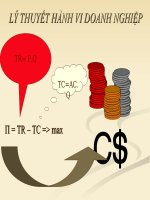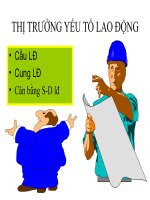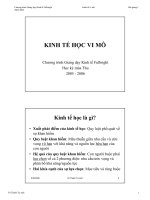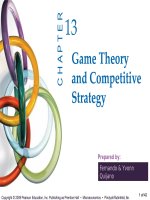Bài giảng kinh tế vi mô chap1 premium
Bạn đang xem bản rút gọn của tài liệu. Xem và tải ngay bản đầy đủ của tài liệu tại đây (489.23 KB, 35 trang )
1
Ten Principles of Economics
PRINCIPLES OF
FOURTH EDITION
N. G R E G O R Y M A N K I W
PowerPoint® Slides
by Ron Cronovich
© 2007 Thomson South-Western, all rights reserved
In this chapter, look for the answers to these
questions:
What kinds of questions does economics
address?
What are the principles of how people make
decisions?
What are the principles of how people interact?
What are the principles of how the economy as a
whole works?
CHAPTER 1
TEN PRINCIPLES OF ECONOMICS
2
What Economics Is All About
Scarcity refers to the limited nature of society’s
resources.
Economics is the study of how society manages
its scarce resources, including
• how people decide how much to work, save,
and spend, and what to buy
• how firms decide how much to produce,
how many workers to hire
• how society decides how to divide its resources
between national defense, consumer goods,
protecting the environment, and other needs
CHAPTER 1
TEN PRINCIPLES OF ECONOMICS
3
HOW PEOPLE MAKE DECISIONS
Decision making is
at the heart of
economics.
The first four
principles deal with
how people make
decisions.
CHAPTER 1
TEN PRINCIPLES OF ECONOMICS
4
HOW PEOPLE MAKE DECISIONS
Principle
Principle #1:
#1: People
People Face
Face Tradeoffs
Tradeoffs
All decisions involve tradeoffs. Examples:
Going to a party the night before your midterm
leaves less time for studying.
Having more money to buy stuff requires working
longer hours, which leaves less time for leisure.
Protecting the environment requires resources
that might otherwise be used to produce
consumer goods.
CHAPTER 1
TEN PRINCIPLES OF ECONOMICS
5
HOW PEOPLE MAKE DECISIONS
Principle
Principle #1:
#1: People
People Face
Face Tradeoffs
Tradeoffs
Society faces an important tradeoff:
efficiency vs. equity
efficiency: getting the most out of scarce resources
equity: distributing prosperity fairly among society’s
members
Tradeoff: To increase equity, can redistribute
income from the well-off to the poor.
But this reduces the incentive to work and produce,
and shrinks the size of the economic “pie.”
CHAPTER 1
TEN PRINCIPLES OF ECONOMICS
6
HOW PEOPLE MAKE DECISIONS
Principle
Principle #2:
#2: The
The Cost
Cost of
of Something
Something Is
Is What
What
You
You Give
Give Up
Up to
to Get
Get ItIt
Making decisions requires comparing the costs
and benefits of alternative choices.
The opportunity cost of any item is whatever
must be given up to obtain it.
It is the relevant cost for decision making.
CHAPTER 1
TEN PRINCIPLES OF ECONOMICS
7
HOW PEOPLE MAKE DECISIONS
Principle
Principle #2:
#2: The
The Cost
Cost of
of Something
Something Is
Is What
What
You
You Give
Give Up
Up to
to Get
Get ItIt
Examples:
The opportunity cost of…
…going to college for a year is not just the tuition,
books, and fees, but also the foregone wages.
…seeing a movie is not just the price of the ticket,
but the value of the time you spend in the theater.
CHAPTER 1
TEN PRINCIPLES OF ECONOMICS
8
HOW PEOPLE MAKE DECISIONS
Principle
Principle #3:
#3: Rational
Rational People
People Think
Think at
at the
the
Margin
Margin
A person is rational if she systematically and
purposefully does the best she can to achieve
her objectives.
Many decisions are not “all or nothing,”
but involve marginal changes – incremental
adjustments to an existing plan.
Evaluating the costs and benefits of marginal
changes is an important part of decision making.
CHAPTER 1
TEN PRINCIPLES OF ECONOMICS
9
HOW PEOPLE MAKE DECISIONS
Principle
Principle #3:
#3: Rational
Rational People
People Think
Think at
at the
the
Margin
Margin
Examples:
A student considers whether to go to college
for an additional year, comparing the fees &
foregone wages to the extra income he could
earn with an extra year of education.
A firm considers whether to increase output,
comparing the cost of the needed labor and
materials to the extra revenue.
CHAPTER 1
TEN PRINCIPLES OF ECONOMICS
10
HOW PEOPLE MAKE DECISIONS
Principle
Principle #4:
#4: People
People Respond
Respond to
to Incentives
Incentives
incentive: something that induces a person to
act, i.e. the prospect of a reward or punishment.
Rational people respond to incentives because
they make decisions by comparing costs and
benefits. Examples:
• In response to higher gas prices,
sales of “hybrid” cars (e.g., Toyota Prius) rise.
• In response to higher cigarette taxes,
teen smoking falls.
CHAPTER 1
TEN PRINCIPLES OF ECONOMICS
11
ACTIVE LEARNING
Exercise
1:
You are selling your 1996 Mustang. You have
already spent $1000 on repairs.
At the last minute, the transmission dies. You can
pay $600 to have it repaired, or sell the car “as is.”
In each of the following scenarios, should you have
the transmission repaired?
A. Blue book value is $6500 if transmission works,
$5700 if it doesn’t
B. Blue book value is $6000 if transmission works,
$5500 if it doesn’t
12
ACTIVE LEARNING
Answers
1:
Cost of fixing transmission = $600
A. Blue book value is $6500 if transmission works,
$5700 if it doesn’t
Benefit of fixing the transmission = $800
($6500 – 5700).
It’s worthwhile to have the transmission fixed.
B. Blue book value is $6000 if transmission works,
$5500 if it doesn’t
Benefit of fixing the transmission is only $500.
Paying $600 to fix transmission is not worthwhile.
13
ACTIVE LEARNING
Answers
1:
Observations:
The $1000 you previously spent on repairs is
irrelevant. What matters is the cost and benefit
of the marginal repair (the transmission).
The change in incentives from scenario A
to scenario B caused your decision to change.
14
HOW PEOPLE INTERACT
An “economy” is just
a group of people
interacting with
each other.
The next
three principles
deal with how people
interact.
CHAPTER 1
TEN PRINCIPLES OF ECONOMICS
15
HOW PEOPLE INTERACT
Principle
Principle #5:
#5: Trade
Trade Can
Can Make
Make Everyone
Everyone Better
Better
Off
Off
Rather than being self-sufficient, people can
specialize in producing one good or service
and exchange it for other goods.
Countries also benefit from trade & specialization:
• get a better price abroad for goods they
•
produce
buy other goods more cheaply from abroad
than could be produced at home
CHAPTER 1
TEN PRINCIPLES OF ECONOMICS
16
HOW PEOPLE INTERACT
Principle
Principle #6:
#6: Markets
Markets Are
Are Usually
Usually A
A Good
Good Way
Way
to
to Organize
Organize Economic
Economic Activity
Activity
A market is a group of buyers and sellers.
(They need not be in a single location.)
“Organize economic activity” means determining
• what goods to produce
• how to produce them
• how much of each to produce
• who gets them
CHAPTER 1
TEN PRINCIPLES OF ECONOMICS
17
HOW PEOPLE INTERACT
Principle
Principle #6:
#6: Markets
Markets Are
Are Usually
Usually A
A Good
Good Way
Way
to
to Organize
Organize Economic
Economic Activity
Activity
In a market economy, these decisions result from
the interactions of many households and firms.
Famous insight by Adam Smith in
The Wealth of Nations (1776):
Each of these households and firms
acts as if “led by an invisible hand”
to promote general economic well-being.
CHAPTER 1
TEN PRINCIPLES OF ECONOMICS
18
HOW PEOPLE INTERACT
Principle
Principle #6:
#6: Markets
Markets Are
Are Usually
Usually A
A Good
Good Way
Way
to
to Organize
Organize Economic
Economic Activity
Activity
The invisible hand works through the price system:
• The interaction of buyers and sellers
determines prices of goods and services.
• Each price reflects the good’s value to buyers
and the cost of producing the good.
• Prices guide self-interested households and
firms to make decisions that, in many cases,
maximize society’s economic well-being.
CHAPTER 1
TEN PRINCIPLES OF ECONOMICS
19
HOW PEOPLE INTERACT
Principle
Principle #7:
#7: Governments
Governments Can
Can Sometimes
Sometimes
Improve
Improve Market
Market Outcomes
Outcomes
Important role for govt: enforce property rights
(with police, courts)
People are less inclined to work, produce, invest, or
purchase if large risk of their property being stolen.
•
A restaurant won’t serve meals if customers
do not pay before they leave.
•
A music company won’t produce CDs if too many
people avoid paying by making illegal copies.
CHAPTER 1
TEN PRINCIPLES OF ECONOMICS
20
HOW PEOPLE INTERACT
Principle
Principle #7:
#7: Governments
Governments Can
Can Sometimes
Sometimes
Improve
Improve Market
Market Outcomes
Outcomes
Govt may alter market outcome to promote efficiency
market failure, when the market fails to allocate
society’s resources efficiently. Causes:
• externalities, when the production or consumption
of a good affects bystanders (e.g. pollution)
• market power, a single buyer or seller has
substantial influence on market price (e.g. monopoly)
In such cases, public policy may increase efficiency.
CHAPTER 1
TEN PRINCIPLES OF ECONOMICS
21
HOW PEOPLE INTERACT
Principle
Principle #7:
#7: Governments
Governments Can
Can Sometimes
Sometimes
Improve
Improve Market
Market Outcomes
Outcomes
Govt may alter market outcome to promote equity
If the market’s distribution of economic well-being
is not desirable, tax or welfare policies can change
how the economic “pie” is divided.
CHAPTER 1
TEN PRINCIPLES OF ECONOMICS
22
A C T I V E L E A R N I N G 2:
Discussion Questions
In each of the following situations, what is the
government’s role? Does the government’s
intervention improve the outcome?
a. Public schools for K-12
b. Workplace safety regulations
c. Public highways
d. Patent laws, which allow drug companies to
charge high prices for life-saving drugs
23
HOW THE ECONOMY AS A WHOLE WORKS
The last three
principles deal with
the economy as a
whole.
CHAPTER 1
TEN PRINCIPLES OF ECONOMICS
24
HOW THE ECONOMY AS A WHOLE WORKS
Principle
Principle #8:
#8: A
A country’s
country’s standard
standard of
of living
living
depends
depends on
on its
its ability
ability to
to produce
produce goods
goods &
&
services.
services.
Huge variation in living standards across
countries and over time:
• Average income in rich countries is more than
ten times average income in poor countries.
• The U.S. standard of living today is about
eight times larger than 100 years ago.
CHAPTER 1
TEN PRINCIPLES OF ECONOMICS
25









